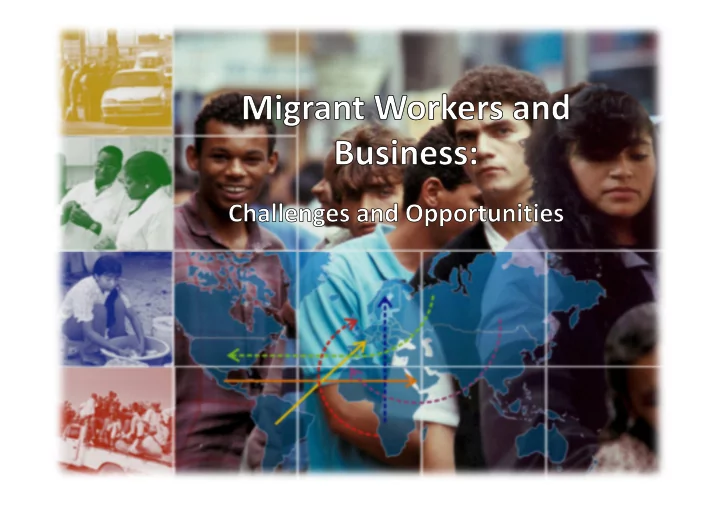

WEBINAR OUTLINE I. Migrants’ human right to freedom of association A. Normative basis B. The business value of allowing migrants to join unions C. What to do where freedom of association is limited or prohibited II. Temporary/circular migration schemes A. Problems associated with these schemes III. Labour and skills shortages IV. Working/living conditions A. Retention of passports B. Confinement or limited mobility C. Discrimination D. Working hours E. Poor living conditions V. Supply chain ethics A. Options for businesses VI. ILO tools
Situation 1:
Migrant workers don’t need to have freedom of association. Our company provides them with lodging, meals, on-site medical facilities, a small gym and many other amenities that keep them happy. Why would they want to or need to join a trade union or workers’ organisation? Trade unions only make trouble and cause problems. We don’t want our foreign workers to be associated with that.
MIGRANTS’ HUMAN RIGHT TO FREEDOM OF ASSOCIATION � Global Compact Principle 3: Businesses should uphold the freedom of association and the effective recognition of the right to collective bargaining � ILO Fundamental Principles and Rights at Work: � ILO Convention concerning Freedom of Association and Protection of the Right to Organise, 1948 (No. 87) � ILO Freedom of Association and Protection of the Right to Organise Convention, 1948 (No. 87): � Article 2: “Workers and employers, without distinction whatsoever, shall have the right to establish and, subject only to the rules of the organisation concerned, to join organisation of their own choosing without previous authorisation.”
� ILO Migration for Employment Convention (Revised), 1949 (No. 97) � Article 6: “Each Member for which this Convention is in force undertakes to apply, without discrimination in respect of nationality, race, religion or sex, to immigrants lawfully within its territory, treatment no less favourable than that which applies to its own nationals in respect of the following matters: (a) in so far as such matters are regulated by law or regulations, or are subject to the control of administrative authorities--… (ii) membership of trade unions and enjoyment of the benefits of collective bargaining
The Business Value of Allowing Migrants to Join Unions o Respect from customers/clients for respect of human rights � Potential for increased sales and consumers’ loyalty o Migrant are also CONSUMERS: � Giving access to migrant workers to an effective means of improving their wage and working conditions (ie., trade union membership) so that they are able to spend more will boost economy and benefit one’s own firm and profits
What can businesses do when operating in a country where freedom of association is severely limited or prohibited for migrant workers? 1. Consider moving operations to comparable location that does protect migrant workers’ freedom of association 2. Join employers’ association in order to lobby governments (including through the ILO) to allow for migrant workers’ freedom of association and other labour rights
TEMPORARY/CIRCULAR MIGRATION SCHEMES Can they really be a solution to structural labour shortages, especially in the low to mid-skilled sectors?
Problems Associated with Temporary/Circular Migration Schemes � Creating space for recruitment abuses � Potential protection deficits in terms of restrictions on labour rights � Waste of employers’ training in workers and inefficiencies due to short time-span and/or need of migrant to exit country of employment in order to be eligible for re-hiring � Increasing precarious employment by filling structural (permanent) labour shortages with temporary workers � Tying workers to one employer, which has potential to lead to forced labour-like situations � Tendency for passport retention � No possibility of family reunion � Incentivises irregular migration or work
Situation 2:
LABOUR AND SKILLS SHORTAGES Result of convergence of workforce demographics (lower birth rates, ageing population) and consequences of national economic development (rising expectations of local populations)
WORKING/LIVING CONDITIONS
Retention of passports • � Violation under UN Migrant Workers Convention � ILO indicator of forced labour, trafficking Confinement of workers and limiting workers’ physical mobility • Discrimination • � Wage discrimination � Employment discrimination � Xenophobia, scapegoating, violence against migrants in host societies Working hours without recognition of overtime hours • Poor living conditions and lodging •
SUPPLY CHAIN ETHICS Options for businesses in order to prevent or address abuse of migrant workers in their supply chains: � Code of conduct with regards to subcontractors or suppliers � Establish accountability mechanisms with suppliers � Engage with concerned employers’ associations, trade unions and governments to prevent and address
ILO TOOLS � Useful for designing internal company policies or codes of conduct 1. All ILO International Labour Standards, in particular: - ILO Private Employment Agencies Convention, 1997 (No. 181) - ILO Equal Remuneration Convention, 1951 (No. 100) - ILO Discrimination (Employment and Occupation) Convention (No. 111) 2. ILO conventions and recommendations on migrant workers: - ILO Migration for Employment Convention, 1949 (No. 97) - ILO Migrant Workers (Supplementary Provisions) Convention, 1975 (No. 143) - ILO Recommendation No.86 - ILO Recommendation No. 151 3. ILO Multilateral Framework on Labour Migration � Good practices in Annex, many involving private companies 4. ILO Employers’ Handbook on Anti-Discrimination
THANK YOU
ILO International Migration Branch www.ilo.org/migrant migrant@ilo.org ILO Helpdesk for Business on International Labour Standards www.ilo.org/business assistance@ilo.org
Recommend
More recommend